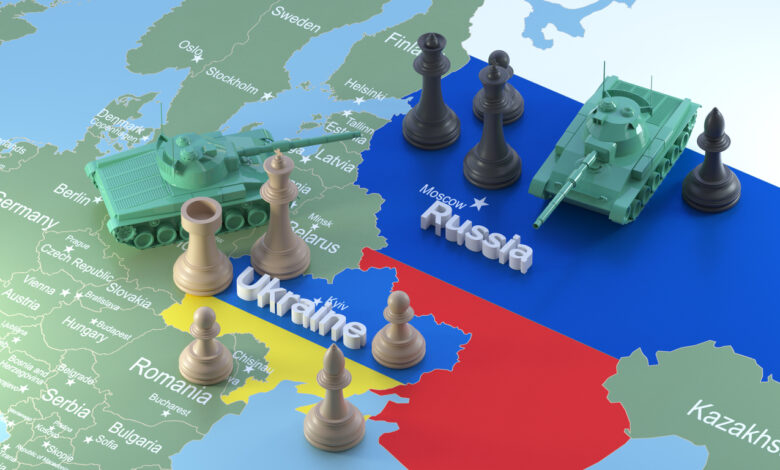The DSR Daily Brief Newsletter – Monday, April 18, 2022

SPECIAL ANNOUNCEMENT: The Ukraine Daily Brief is now ‘The DSR Daily Brief.’ We will still cover the war in Ukraine, but are expanding our scope to include foreign policy, national security and economic developments elsewhere in the world. You can help shape our evolving coverage by suggesting topics of interest to you at udb@thedsrnetwork.com.
Tune in to today’s DSR Daily Brief podcast. Please be sure to rate and review. (We know that many of you are receiving the podcast in our member feed, but reviews help with discoverability.) Some notable links referenced in today’s podcast can be viewed here.
Ukraine
Russia continues to target core infrastructure and civilians in Ukraine. It claims to have hit another munitions factory. The situation in Mariupol is increasingly dire and defines Zelensky’s red line for peace talks.
Russia issues a ‘formal diplomatic note’ to the US, warning against arming Ukraine. The Pentagon confirms Ukraine’s claim that its Neptune missiles ultimately caused the Moskva to sink. Russia denied this, but launched a bombing campaign on an anti-ship missile factory nevertheless.
These developments signal a few important trends. The first is the extent to which Cold War-era posturing is still a part of the Russian playbook. The second is the speed with which digital media is crowdsourcing the facts behind the posturing.
The Americas
The Brazilian real’s ‘monster rally’ is imperiled by war and COVID-related supply issues, as well as the prospect of additional interest rate hikes by the US Federal Reserve.
Biden announced a plan to make 144,000 acres of federal land available for oil and gas drilling. Environment groups aren’t happy with this reversal of campaign pledges. The Department of Defense looks to nuclear energy once again.
Climate-friendly energy policies have taken a back seat to fears of economic and political fallout in the short term, especially in the US and Germany. In the longer term, however, the desire to isolate Russia is accelerating moves toward net-zero. There is an artful balance to be achieved here and it’s important to keep the end goal in mind: decreasing hydrocarbon dependence on politically problematic countries.
Europe and Central Asia
President Volodymyr Zelensky spoke with IMF Managing Director, Kristalina Georgieva, about securing Ukraine’s post-war future. Meanwhile, a kindred spirit in ethnonationalism and genocide, Serbia is standing by fellow ‘pariah’ Russia.
A German poll shows growing dissatisfaction with Chancellor Olaf Scholz. Easter marches were held across the country simultaneously calling for an end to the war and opposing an increase in German defense spending. Berlin now faces a ‘conundrum’ in balancing these interests.
A key takeaway here is the health of Germany’s postwar, post-unification democracy in the face of a new moral crisis. The de facto leader of western Europe does not represent a monolith of opinion, neither in its population nor its three-party coalition government.
The Indo-Pacific
For weeks, pundits have drawn parallels between the Ukraine crisis and the looming threat Taiwan faces. (The DSR Network’s Grant Haver wrote about this within days of Russia’s invasion.) China’s reaction to US officials visiting Taiwan supports this thinking.
The US has earmarked $14.2 billion of weapons to support Taiwan, but a backlog of transers was reported. The Bureau of Industry and Security takes aim on another front: fighting copyright infringement and industrial espionage in the tech economy.
A hack attempt on undersea cables in the Pacific has been attributed to an unnamed ‘international hacking group.’ North Korea was linked to a $625 million hack revealing its ability to fund future threats to national security.
The Middle East and Africa
Israel evacuates Jewish Ukrainians from Moldova. Israeli ambassador to Russia, Alex Ben Zvi, is summoned for a ‘reprimand’ over its UNGA vote and remarks deemed ‘anti-Russian’ by Russian Foreign Minister Sergey Lavrov. Lavrov also accused Israel of trying to divert attention from the ‘Palestinian issue.’
Hopefully this rift will create a space for Israel to take a more active stance against Russia. So far, it has been playing both sides of the fence, in what some perceive as deference to Israel’s defense industry.
DSR Exclusives
Stay tuned to Deep State Radio, Next in Foreign Policy and our sister podcasts for in-depth analysis and expertise.
Tune in to tomorrow’s podcast for new and evolving stories.
The DSR Network Team (Chris Cotnoir, Grant Haver, and Katherine Hill)

